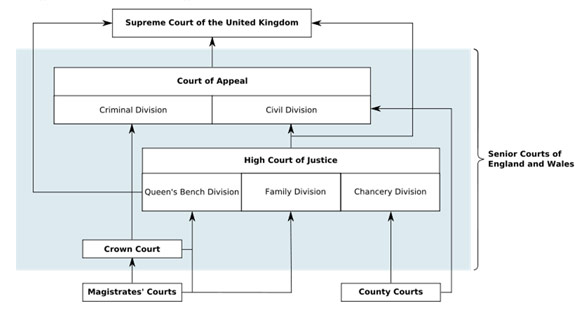

A simplified representation of the court system of England and Wales is shown above.
- Civil courts
- Magistrates Court: Only limited civil jurisdiction (adoption, guardianship, child welfare)
- County Court: Each County Court (also known as small claims court) has its own geographical zone. Deals with professional negligence, personal injury etc.
- High Court: Has both Criminal and Civil functions
- Queen's Bench: Deals with actions relating to contract or tort (civil wrongs i.e. medical negligence or defamation)
- Family Division: Deals with divorce, wardship and adoption
- Chancery Division: Company and insolvency law
- Criminal courts
- Magistrates Court: All criminal cases start here and 93% end here. If the magistrate believes that the seriousness of the offence warrants a longer sentence than the Magistrate court can give, the case is referred to the Crown Court for sentencing.
- Crown Court: A judge and jury presides. Normally serious crimes (rape, grievous bodily harm, murder etc.)
- Appeals against Magistrate court are heard in Crown Court
- Appeals for criminal cases in Crown Court are heard in the Court of Appeal - Criminal Division
- Appeals for civil cases in County Courts & High Courts are heard in the Court of Appeal - Civil Division
- Final appeal is from House of Lords, but they only hear on cases of public interest and appeals based on points of law
English criminal law derives from Common law (see below). This identifies and criminalises behaviour that directly threatens the well-being of an individual or general population (manslaughter, murder, theft etc.). The prosecution is brought on by the Crown Prosecution Service (CPS) on the victim's behalf.
Civil Law
Civil law is usually a private matter where the claimant usually initiates proceedings. The object of civil law is compensation. Some incidents may result in both Criminal and Civil proceedings (i.e. a road traffic accident may result in criminal proceedings for reckless driving and a subsequent civil case for personal injury).
The basis of English Common law is that it is made by judges sitting in courts, applying their own judgement and knowledge of legal precedent to the case. Common law is also known as "case law" as it derives from the judgements made in previous cases. The judgements are binding so that if a similar case came up again the same decision would be made. The doctrine of precedent means that lower courts are bound by judgements made from higher courts. This system is flexible as no two cases are identical and allows for changes in social norms.
The law in relation of clinical negligence has developed chiefly through case law. The Bolam test was established via the case Bolam v Friern HMC (1957).
Statute law
Statute law is that enacted by Parliament and always supersedes common law. If there is a conflict between 2 statutes, the later one prevails. Some areas of medical practise are goverened more by statutory law law than common law. Abortion is chielfy goverend by statute law (Abortion Act 1967), whereas the ability to consent is goverened by the Mental Capacity Act (2005) and common law.
European law
The UK is a member of the EU. EU obligations have to be formally incorporated into English Law before the courts have to apply them. The European Convention on Human Rights (ECHR) and Fundamental Freedoms was signed in 1950 and the UK applied the principles to the Human Rights Act 1998 (which places a duty on all courts to interpret legislation so far as possible with the rights laid down in ECHR). So a breach of a Convention right would now go to the UK courts rather than to the European Courts of Human Rights in Strasbourg. Interpretation of the ECHR may differ between countries (a ruling in France would not be binding in England).


 . About
. About